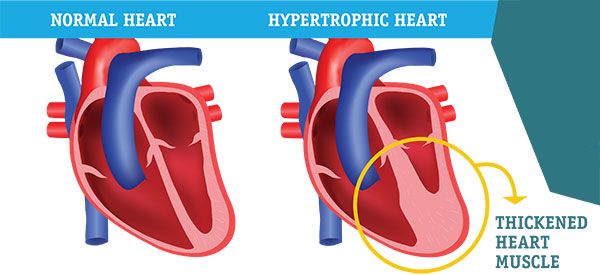Overview
In most cases, hypertrophic cardiomyopathy (HCM) is an inherited condition passed down in families. If you have HCM, you likely were born with a gene mutation that changes the “instruction manual” telling cells what to do. This change makes the heart muscle become too thick.
“Hypertrophy” means to thicken. This thickening can make it harder for the heart to relax and fill with blood and pump oxygen-rich blood to the body.

HCM can be difficult to diagnose, especially as many people don’t have symptoms. When they do, it can be mistaken for other conditions, including heart valve disease—mitral valve disorders, aortic stenosis—exercise-induced asthma or anxiety.
Early diagnosis is important to avoid complications, including life-threatening heart rhythms and sudden death. Tragically, HCM is one of the most common reasons for sudden deaths among young people and athletes who didn’t know they had the condition.
HCM usually affects the main pumping chamber of the heart (left ventricle) and the muscle wall that separates the left and right sides of the heart (septum). If the muscle wall becomes thicker than normal, it can bulge into the lower chamber of the heart.
This bulge can disrupt the flow of blood to the main artery that carries blood to your body (aorta). If this happens, you may feel very tired or have a hard time catching your breath.
When do these changes happen? It varies. The thickening of the heart muscle often coincides with growth spurts in puberty as someone physically matures, and then it levels off. But many patients won’t notice anything. When they do, it might not be until middle age. Still, its presence can be deadly. A sudden death may be how it is found.
The good news is that with ongoing care, many people with HCM can live a long life.
- Last Edited 11/20/2020
- Medical Reviewer(s):
- Michelle M. Kittleson
- Jil C. Tardiff
- Martha Gulati
